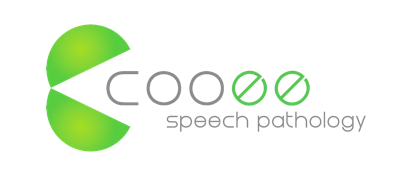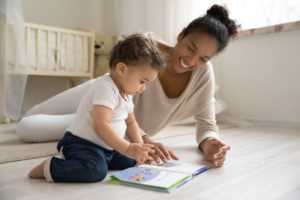Language Development in the first 5 years
Language development is the process of learning to communicate through a formal system (language) to express ideas and understand others. As children grow they develop more complex language skills to support them to communicate in new and changing environments as they move through various stages in life.
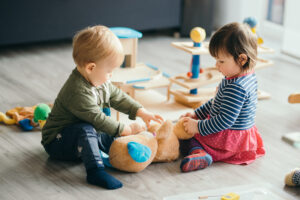
Terms your speech pathologist might use when talking about language development:
- Communication – The act of sharing thoughts, feelings, opinions or information with others. We can communicate in a variety of ways including spoken, written or signed languages, or through informal methods such as gestures, sounds, facial expressions and actions.
- Language – The structured system of words and rules used to communicate thoughts, feelings, and information. It includes understanding and using words, grammar, sentences, stories and social rules of conversation. Language can be verbal, written or multimodal (symbols) forms of languages (eg: English, Spanish, Japanese) or sign language (Auslan, ASL).
- Receptive Language – The ability to comprehend and understand language. It involves understanding the meanings of words, comprehending sentences and questions, and processing information through both listening and reading.
- Expressive language – The ability to use words, sentences and gestures to communicate thoughts and ideas. It involves using words and constructing sentences to express information through both speaking and writing.
- Pragmatics – How language is used to interact with others. This includes reasons for communicating (giving directions, explaining, asking questions) as well as understanding and following social conventions in conversation and using non-verbal communication including eye contact and body language.
- Analytic Language Learners – Analytic language learners develop language through small units – words initially before beginning to combine words. They start at the single word level then move to using two-word, three-word and then more words together to make sentences.
- Gestalt Language Processors – Gestalt Language Processors develop language through larger units initially, which are referred to as ‘gestalts’. Gestalts are sentences or phrases which represent a single idea for that person. As their language develops they break down these gestalts into phrases and single words to be used more flexibly to create new phrases and sentences.
For more information on the two types of language development, Analytic Language Development and Gestalt Language Processing, Click Here!
Developmental Patterns
We recognise that all children are unique and understand that this also extends to the development of language. While language development does not look the same for everyone, if your child’s language appears to be stuck at any stage, they may benefit from the support of a speech pathologist.
First Year
By their first birthday, children generally learn to…
- Enjoy engaging in back and forth communication with others through laughter, looking and facial expressions.
- Understand about 10 words and respond to their name.
- Recognise greetings and gestures, including ‘hi’ and ‘bye-bye’
- Recognise a few words for familiar people and objects.
- Start to use sounds, gestures and a few words to communicate.
- Continue to babble and explore the sounds they can make.
- Copy noises and sounds they hear.
Before children begin using formal language, they develop communication skills called pre-linguistic skills. For more information on communication skills that develop before your child says their first word, Click Here!
Second Year
By their second birthday, children generally learn to…
- Understand words for objects and people they cannot see, including look for objects when asked.
- Use words to communicate more often than gesture and sounds.
- Respond to simple questions with ‘what’ and ‘where’.
- Understand when an object is in or on something.
- Point to body parts when they are named.
- Say more than 50 single words.
- Put two words together, for example, ‘no ball’ or ‘bye teddy’.
- Start using ‘mine’ and ‘my’ to talk about objects or people.
- The listener may need to use information from the context to understand.
Children who are not saying 50 different words or putting two words together at the age of two can be referred to as late talkers. For more information on late talking, including possible reasons, when to seek support and strategies to use, Click Here!
Third Year 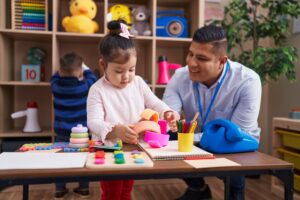
.By their third birthday, children generally learn to…
- Use new words easily and frequently.
- Use four to five words in a sentence.
- Ask and answer questions about objects (what?) people (who?) and events (what __ doing? where ___ going?).
- Understand the concepts ‘same’ and ‘different’.
- Using language to talk about people or objects they cannot see.
- Ask and answer ‘why’ questions.
- Follow instructions with two parts (e.g., give me the teddy and throw the ball).
- Talk about something that happened in the past.
- Have a conversation but may not take turns or stay on topic.
Fourth Year 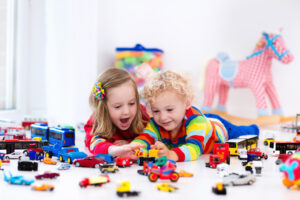
By their fourth birthday, children generally learn to…
- Answer questions about daily tasks and ‘the here and now’ – ie. what is happening in the moment, but not what has happened in the past or will happen in the future.
- Understand most ‘wh’ questions (i.e. ‘what’, ‘who’, ‘where’, ‘when’). ‘How’ and ‘why’ questions may still need support.
- Answer questions about a story they have heard.
- Use words such as ‘and’, ‘but’, and ‘because’ to make longer sentences.
- Describe recent events and routines.
- Ask a lot of questions.
- Use pronouns such as ‘he’, ‘she’, ‘me’, ‘you’ and negations such as ‘don’t’, ‘can’t’.
- Have a conversation, and participate somewhat on topic for a few turns.
- Talk about something that has happened in the past and share a personal narrative.
For more information on communication skills for kindy, Click Here!
Fifth Year 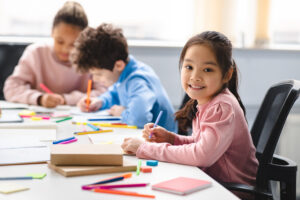
With this in mind, by their fifth birthday, children generally learn to…
- Use well formed sentences to be understood by most people.
- Take turns in increasingly longer conversations.
- Use language in less direct ways – to make hints eg: “those smell good.”
- Use ‘when’, ‘so’ and ‘if’ to join ideas in sentences.
- Tell simple, short stories that include events.
- Use past and future verbs correctly (e.g., went, will go).
- Change their message or communication when asked.
- Follow three part instructions (e.g., put your shoes on, get your backpack and line up outside).
- Understand instructions without stopping to listen.
- Understand time related words (e.g., before, after, now, later).
- Start thinking about the meaning of words when learning.
For more information on the developmental skills which support children’s learning in prep, Click Here!
Speech Pathologists are professionals dedicated to helping support children’s communication development. To talk with one of our Brisbane Speech Pathologist, call Cooee on 3265 4495 and book a Client Journey Planning session to ask your questions and receive tailored advice.
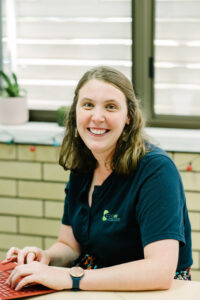
Written by Tess Marson Speech Pathologist
